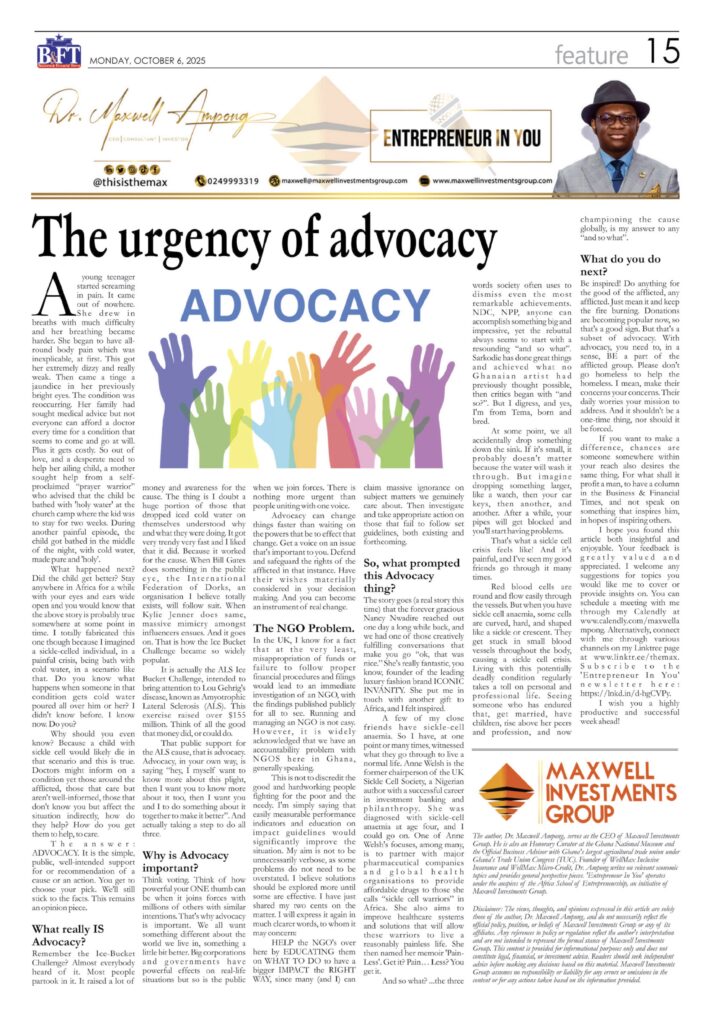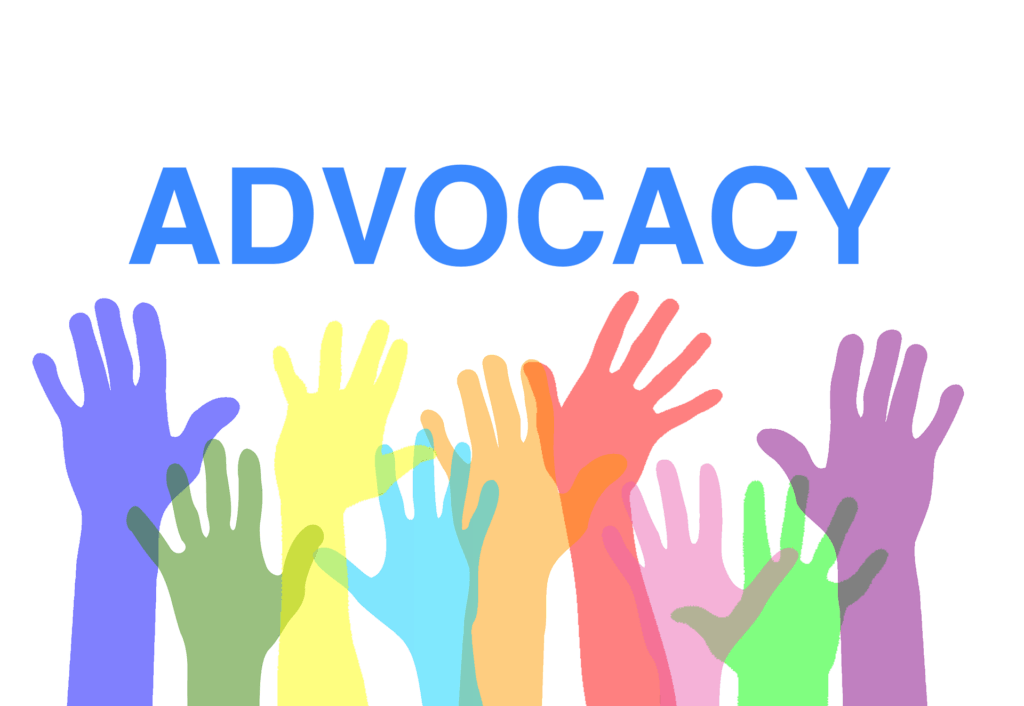
A young teenager started screaming in pain. It came out of nowhere. She drew in breaths with much difficulty and her breathing became harder. She began to have all-round body pain which was inexplicable, at first. This got her extremely dizzy and really weak. Then came a tinge a jaundice in her previously bright eyes. The condition was reoccurring. Her family had sought medical advice but not everyone can afford a doctor every time for a condition that seems to come and go at will. Plus it gets costly. So out of love, and a desperate need to help her ailing child, a mother sought help from a self-proclaimed “prayer warrior” who advised that the child be bathed with ‘holy water’ at the church camp where the kid was to stay for two weeks. During another painful episode, the child got bathed in the middle of the night, with cold water, made pure and ‘holy’.
What happened next? Did the child get better? Stay anywhere in Africa for a while with your eyes and ears wide open and you would know that the above story is probably true somewhere at some point in time. I totally fabricated this one though because I imagined a sickle-celled individual, in a painful crisis, being bath with cold water, in a scenario like that. Do you know what happens when someone in that condition gets cold water poured all over him or her? I didn’t know before. I know now. Do you?
Why should you even know? Because a child with sickle cell would likely die in that scenario and this is true. Doctors might inform on a condition yet those around the afflicted, those that care but aren’t well-informed, those that don’t know you but affect the situation indirectly, how do they help? How do you get them to help, to care.
The answer: ADVOCACY. It is the simple, public, well-intended support for or recommendation of a cause or an action. You get to choose your pick. We’ll still stick to the facts. This remains an opinion piece.
What really IS Advocacy?
Remember the Ice-Bucket Challenge? Almost everybody heard of it. Most people partook in it. It raised a lot of money and awareness for the cause. The thing is I doubt a huge portion of those that dropped iced cold water on themselves understood why and what they were doing. It got very trendy very fast and I liked that it did. Because it worked for the cause. When Bill Gates does something in the public eye, the International Federation of Dorks, an organisation I believe totally exists, will follow suit. When Kylie Jenner does same, massive mimicry amongst influencers ensues. And it goes on. That is how the Ice Bucket Challenge became so widely popular.
It is actually the ALS Ice Bucket Challenge, intended to bring attention to Lou Gehrig’s disease, known as Amyotrophic Lateral Sclerosis (ALS). This exercise raised over $155 million. Think of all the good that money did, or could do.
That public support for the ALS cause, that is advocacy. Advocacy, in your own way, is saying “hey, I myself want to know more about this plight, then I want you to know more about it too, then I want you and I to do something about it together to make it better”. And actually taking a step to do all three.
Why is Advocacy important?
Think voting. Think of how powerful your ONE thumb can be when it joins forces with millions of others with similar intentions. That’s why advocacy is important. We all want something different about the world we live in, something a little bit better. Big corporations and governments have powerful effects on real-life situations but so is the public when we join forces. There is nothing more urgent than people uniting with one voice.
Advocacy can change things faster than waiting on the powers that be to effect that change. Get a voice on an issue that’s important to you. Defend and safeguard the rights of the afflicted in that instance. Have their wishes materially considered in your decision making. And you can become an instrument of real change.
The NGO Problem.
In the UK, I know for a fact that at the very least, misappropriation of funds or failure to follow proper financial procedures and filings would lead to an immediate investigation of an NGO, with the findings published publicly for all to see. Running and managing an NGO is not easy. However, it is widely acknowledged that we have an accountability problem with NGOS here in Ghana, generally speaking.
This is not to discredit the good and hardworking people fighting for the poor and the needy. I’m simply saying that easily measurable performance indicators and education on impact guidelines would significantly improve the situation. My aim is not to be unnecessarily verbose, as some problems do not need to be overstated. I believe solutions should be explored more until some are effective. I have just shared my two cents on the matter. I will express it again in much clearer words, to whom it may concern:
HELP the NGO’s over here by EDUCATING them on WHAT TO DO to have a bigger IMPACT the RIGHT WAY, since many (and I) can claim massive ignorance on subject matters we genuinely care about. Then investigate and take appropriate action on those that fail to follow set guidelines, both existing and forthcoming.
So, what prompted this Advocacy thing?
The story goes (a real story this time) that the forever gracious Nancy Nwadire reached out one day a long while back, and we had one of those creatively fulfilling conversations that make you go “ok, that was nice.” She’s really fantastic, you know, founder of the leading luxury fashion brand ICONIC INVANITY. She put me in touch with another gift to Africa, and I felt inspired.
A few of my close friends have sickle-cell anaemia. So I have, at one point or many times, witnessed what they go through to live a normal life. Anne Welsh is the former chairperson of the UK Sickle Cell Society, a Nigerian author with a successful career in investment banking and philanthropy. She was diagnosed with sickle-cell anaemia at age four, and I could go on. One of Anne Welsh’s focuses, among many, is to partner with major pharmaceutical companies and global health organisations to provide affordable drugs to those she calls “sickle cell warriors” in Africa. She also aims to improve healthcare systems and solutions that will allow these warriors to live a reasonably painless life. She then named her memoir ‘Pain-Less’. Get it? Pain… Less? You get it.
And so what? …the three words society often uses to dismiss even the most remarkable achievements. NDC, NPP, anyone can accomplish something big and impressive, yet the rebuttal always seems to start with a resounding “and so what”. Sarkodie has done great things and achieved what no Ghanaian artist had previously thought possible, then critics began with “and so?”. But I digress, and yes, I’m from Tema, born and bred.
At some point, we all accidentally drop something down the sink. If it’s small, it probably doesn’t matter because the water will wash it through. But imagine dropping something larger, like a watch, then your car keys, then another, and another. After a while, your pipes will get blocked and you’ll start having problems.
That’s what a sickle cell crisis feels like! And it’s painful, and I’ve seen my good friends go through it many times.
Red blood cells are round and flow easily through the vessels. But when you have sickle cell anaemia, some cells are curved, hard, and shaped like a sickle or crescent. They get stuck in small blood vessels throughout the body, causing a sickle cell crisis. Living with this potentially deadly condition regularly takes a toll on personal and professional life. Seeing someone who has endured that, get married, have children, rise above her peers and profession, and now championing the cause globally, is my answer to any “and so what”.
What do you do next?
Be inspired! Do anything for the good of the afflicted, any afflicted. Just mean it and keep the fire burning. Donations are becoming popular now, so that’s a good sign. But that’s a subset of advocacy. With advocacy, you need to, in a sense, BE a part of the afflicted group. Please don’t go homeless to help the homeless. I mean, make their concerns your concerns. Their daily worries your mission to address. And it shouldn’t be a one-time thing, nor should it be forced.
If you want to make a difference, chances are someone somewhere within your reach also desires the same thing. For what shall it profit a man, to have a column in the Business & Financial Times, and not speak on something that inspires him, in hopes of inspiring others.
I hope you found this article both insightful and enjoyable.
Subscribe to the ‘Entrepreneur In You’ newsletter here: https://lnkd.in/d-hgCVPy.
I wish you a highly productive and successful week ahead!
♕ —- ♕ —- ♕ —- ♕ —- ♕
Disclaimer: The views, thoughts, and opinions expressed in this article are solely those of the author, Dr. Maxwell Ampong, and do not necessarily reflect the official policy, position, or beliefs of Maxwell Investments Group or any of its affiliates. Any references to policy or regulation reflect the author’s interpretation and are not intended to represent the formal stance of Maxwell Investments Group. This content is provided for informational purposes only and does not constitute legal, financial, or investment advice. Readers should seek independent advice before making any decisions based on this material. Maxwell Investments Group assumes no responsibility or liability for any errors or omissions in the content or for any actions taken based on the information provided.


